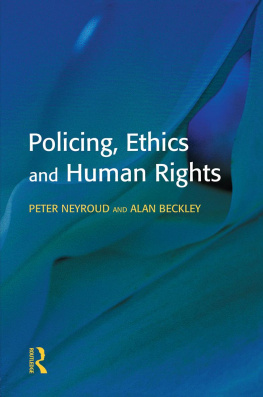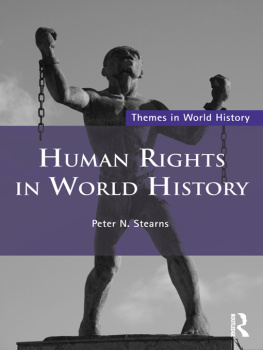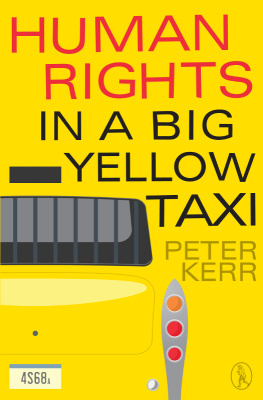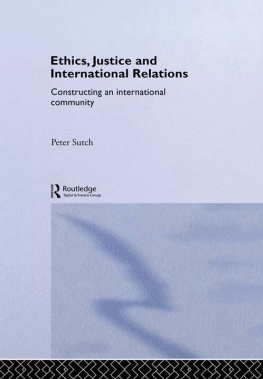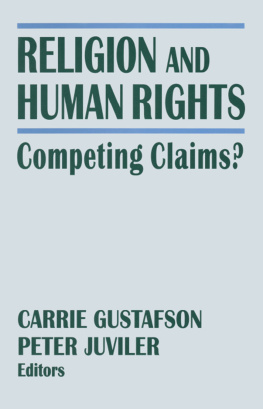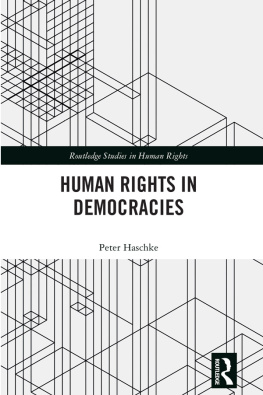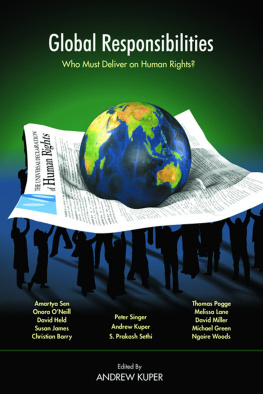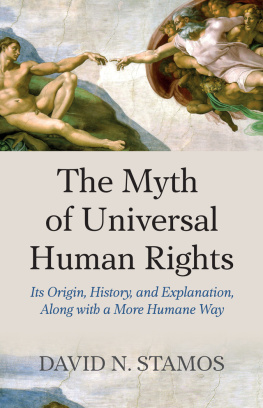Policing, Ethics and Human Rights
Policing and Society Series
Series editors: Les Johnston, Frank Leishman, Tim Newburn
To Sarah and Diane
Looking forward to the return of weekends!
First published by Willan Publishing 2001
This edition published by Routledge 2012
2 Park Square, Milton Park, Abingdon, Oxon OX14 4RN
711 Third Avenue, New York, NY 10017
Routledge is an imprint of the Taylor & Francis Group, an informa business
Peter Neyroud and Alan Beckley, except for:
chapter 6 and chapter 11 Willan Publishing
All rights reserved; no part of this publication may be reproduced, stored in a retrieval system, or transmitted in any form or by any means, electronic, mechanical, photocopying, recording or otherwise without the prior written permission of the Publishers or a licence permitting copying in the UK issued by the Copyright Licensing Agency Ltd, 90 Tottenham Court Road, London W1P 9HE.
ISBN 13: 978-1-903240-16-8 (cased)
ISBN 13: 978-1-903240-15-1 (paper)
British Library Cataloguing-in-Publication Data
A catalogue record for this book is available from the British Library.
Set in Palatino and Gill Sans
Table of Contents
List of figures
3 From ethics to principles and practice
Ethical and human rights compliant covert policing?
Integrating human rights into performance management and inspections
List of figures
2.1 The police role: 1962 Royal Commission
6.10 Analysis of criminal statistics
About the authors and contributors
Peter Neyroud
Peter Neyroud is the Deputy Chief Constable of West Mercia Constabulary. He is the Secretary of the National Committee on the Police Use of Firearms, Vice Chairman of the ACPO Committee on Human Rights and is leading the work on ethics in policing. He is a Fellow of the Royal Society of Arts, a member of the Institute for Public Policy Researchs Forum on Criminal Justice and a council member of Justice, the human rights organisation.
Alan Beckley
Alan Beckley is the head of management development training in West Mercia Constabulary. He has written on the personal liability of police officers following major and critical incidents, and is the editor-in-chief of Police Research and Management , a quarterly management journal for police officers.
Paul Collier
Paul Collier is a lecturer in management accounting at Aston Business School, Aston University, and was formerly head of training and development at West Mercia Constabulary. He has particular responsibility for chapter 6, Police performance management an ethical dilemma?
Julia Clayton
Julia Clayton is an inspector in Cheshire Constabulary and was the chief architect of the ACPO audit of compliance. She is currently on secondment to the Audit Commission. She has particular responsibility for chapter 11, Auditing for compliance: a human rights case study.
Foreword by
the Rt. Hon. Jack Straw, MP, Home Secretary
My time as Home Secretary has strongly reinforced my belief in the high ethical standards which are the foundation of policing in the United Kingdom. Citizens expect and trust the police to do the right thing. That trust is rarely misplaced. The police service is rightly subject to the closest scrutiny. Its role at the sharp end of society frequently confronts officers with ethical dilemmas at personal, operational and organisational levels. These must be faced up to, not avoided. I am only too conscious of the hard decisions and choices which can be presented by issues such as the use of force, covert surveillance, community relations and the maintenance of public order.
The publication of this important book coincides with the implementation of the Human Rights Act, one of the most significant constitutional changes since the 1688 Bill of Rights. The Act is fundamentally about standing up for the values of fairness, respect for human dignity and inclusiveness to which the police service aspires. It emphasises the proper balance of rights and responsibilities between the citizen and the state which goes to the heart of policing.
The Act presents a challenge, but it is not a threat. It places a statutory duty on all public authorities, including the police, not to act incompatibly with the European Convention on Human Rights. However, the practice of policing in this country and the legislation governing it is already very substantially in line with the Convention rights and that has been confirmed by a detailed programme of work undertaken in partnership between the Home Office and the Association of Chief Police Officers. The Convention was largely British-inspired and reflects many principles that are long-standing features of our criminal justice system. In addition, milestone statutes such as the Police and Criminal Evidence Act 1984 have improved compliance further. The arrival of the Human Rights Act therefore confirms what everyone involved in policing already knows. This is that the privilege of providing a service to the public carries with it a special duty of care; a duty to deliver that service in a way which respects the fairness and dignity of the individual.
Striving to act in line with human rights involves the application of fundamental ethical principles which the police service has been standing up for since it came into being, but it can also present conflicts. Few rights are absolute. It is frequently the police who must take responsibility for guarding the boundaries where the actions of one individual have unacceptable consequences for others or for society at large. Long experience of acting in defence of the law is a strong basis for getting the critical choices right on the vast majority of occasions, but there is increasing recognition within policing that there is real value in analysing and understanding the ethical justification for decisions. Bringing ethics to the fore will help to build a culture where respect for human rights is a conscious factor in the whole range of police activity. Leadership at every level is essential to that process and all of us involved in or with a responsibility for policing must embrace and apply the ethical standards we want to see reflected throughout the service.
The issues raised in this book are complex and wide-ranging. I do not necessarily agree with all the views expressed! However, what I do endorse very strongly is the need to promote and strengthen the debate about ethics in policing. This timely book fills a gap by providing a framework for that debate and linking it to the developing agenda on human rights. It does so against a background of rapid change in the policing environment and offers a very helpful analysis of approaches to developing and ensuring an ethical policing culture. It benefits greatly from the authors strong combination of operational and academic experience and their obvious commitment to the practical application of human rights.
Jack Straw
Part 1
Chapter 1
Ethics in context: policing and its environment in the twenty-first century
Policing, ethics and human rights?
The context of policing is changing and the challenges for policing with it. As we move into the twenty-first century, policing, both domestically and globally is in the midst of transition and crisis. There are a number of dimensions to this transition, which were neatly summed up by the questions posed by Patten (1999) in his report on policing for Northern Ireland:
How can professional police officers best adapt to a world in which their own efforts are only a part of the overall policing of a modern society? There is no perfect model for us, no example of a country that, to quote one European police officer, has yet finalised the total transformation from force to service.

